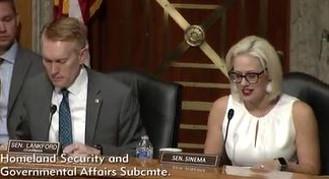This comment offers two specific suggestions in response to issues that OMB sought comment on: Area 2 (Barrier and Burden Reduction) and Area 5 (Stakeholder and Community Engagement).

Scholarly analysis of the potential effects of particular rulemakings from federal agencies, and advice to Congress on how to improve the rulemaking process by GW Regulatory Studies Center scholars.

"Your input and expertise during the drafting of the Early Participation in Regulations Act of 2019 and SMART Act of 2019 was invaluable."
Senator Kyrsten Sinema (D-AZ)
Senator James Lankford (R-OK)
Joint statement
This comment offers two specific suggestions in response to issues that OMB sought comment on: Area 2 (Barrier and Burden Reduction) and Area 5 (Stakeholder and Community Engagement).
The Consumer Protection and Recovery Act
An article co-authored by Howard Beales, professor emeritus of strategic management and public policy at the George Washington University School of Business and senior scholar at the GW Regulatory Studies Center, was cited by the U.S. Supreme Court in a ruling issued earlier this month limiting the Federal Trade Commission’s ability to recover monetary relief for consumers defrauded by companies that use deceptive practices.
DHS's Affidavit of Support on Behalf of Immigrants
The Department of Homeland Security (DHS) is proposing to amend its regulations governing the affidavit of support requirements under section 213A of the Immigration and Nationality Act. The department estimates that the notice of proposed rulemaking (NPRM) will produce direct net costs of up to $2.0 billion over 10 years.
The notice of proposed rulemaking (NPRM) from DHS would amend regulations on the use and collection of biometrics by USCIS, U.S. Customs and Border Protection (CBP), and U.S. Immigration and Customs Enforcement (ICE).
The Federal Employee Paid Leave Act, enacted in 2019, allows several categories of federal employees to substitute up to 12 weeks of paid parental leave for the unpaid leave they are entitled to under the Family and Medical Leave Act. The substitution is permitted in connection with the birth, adoption, or foster care placement of a child with the employee. OPM’s interim final rule implements the legislation.
The NTIA proposal includes several provisions that would narrow the scope of Internet intermediaries’ liability when they remove or restrict access to content provided by others. It would also require the intermediaries to disclose their content moderation policies in a form that is understandable by consumers and small businesses.
In this Notice of Proposed Rulemaking (NPRM), EPA seeks to codify procedures that will ensure adequate consistency and transparency in applying Benefit-Cost Analysis (BCA) to rulemakings under the Clean Air Act (CAA).
Benefit-Cost Analysis at the EPA
“The EPA is “soliciting comment on whether and how EPA should promulgate regulations that provide a consistent and transparent interpretation relating to the consideration of weighing costs and benefits in making regulatory decisions in a manner consistent with applicable authorizing statutes.” I will comment on three issues raised in the proposed EPA rule.
DEA's Mobile Narcotic Treatment Program
Practitioners who want to administer methadone, a schedule II controlled substance, to treat opioid use disorder must first obtain a registration from DEA to operate as a Narcotic Treatment Program (NTP). The Controlled Substances Act (CSA) requires that each person registered with the DEA to dispense controlled substances must obtain a separate registration “at each principal place of business or professional practice.” This requirement generally extends to NTPs. However, the statute also gives DEA the authority to waive this requirement if “consistent with the public health and safety."
DOT's Proposed Rule for Air Travel with Service Animals
The Department of Transportation (DOT) is proposing amendments to its Air Carrier Access Act regulation on the transportation of service animals by air. Multiple parties from a variety of perspectives have called for greater regulatory clarity on what qualifies as a service animal, how airlines should classify emotional support animals (ESAs) for air travel, whether uncommon species should be allowed aboard planes, and how to mitigate health and safety risks caused by animal behavior.
